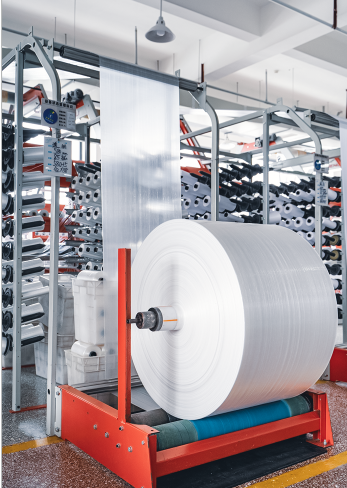Heavy-duty asphalt bags require UV-resistant FIBC bags because prolonged sun exposure degrades the polypropylene material and compromises bag integrity under heavy loads. UV protective bags contain polymer stabilizers that prevent material breakdown and ensure safe storage and transport of asphalt. Without proper UV protection, asphalt gets ruined, and workers face safety risks from bag failures.
UV rays from sunlight don’t just fade colors. They actually break down the plastic fibers in your FIBC bags. The UV radiation attacks the molecular bonds in the polypropylene material, creating weak spots that you can’t see until the bag fails.
This invisible damage accumulates every day your bags sit in direct sunlight. What looks like a perfectly good bag on Monday might fail catastrophically by Friday, spilling thousands of pounds of expensive asphalt.
Standard bags lose strength gradually under UV exposure. The material becomes brittle and develops cracks that spread quickly under the weight of heavy loads.
Asphalt creates the perfect storm for bag failures. You’ve got heavy materials putting constant stress on the bag seams, plus outdoor storage with no protection from the elements.
Most construction sites don’t have covered storage areas for asphalt bags. Your materials sit in full sun exposure day after day, especially during long projects where materials arrive weeks before they’re needed.
Temperature changes make things even worse. Hot days cause expansion, cool nights cause contraction. UV-damaged bags lose flexibility and crack under these daily stress cycles.
When asphalt bags fail, you don’t just lose the expensive material. You face cleanup costs, potential equipment damage, and safety risks for your crew.
UV stability comes from advanced chemistry. Manufacturers add special polymer stabilizers to the plastic during production. These additives absorb UV radiation and convert it to harmless heat instead of letting it damage the bag structure.
This protection has limits, though. Industry standards typically specify around 200 hours of direct sun exposure before the stabilizers become less effective.
| Storage Condition | Expected UV Life |
| Desert Southwest | Reduced due to intense sun |
| Northern Climates | Extended due to lower UV intensity |
| High Altitude Sites | Reduced due to thinner atmosphere |
| Reflective Surfaces | Reduced due to additional UV bounce |
Another factor is your specific location and how you store the bags. Desert climates accelerate degradation significantly, while cloudy regions can extend bag life. High-altitude sites face increased UV intensity due to thinner atmosphere.
Practical tips for extending bag life:
XIFA Group manufactures specialized FIBC bags designed to withstand harsh outdoor conditions while maintaining superior strength and reliability. These industrial containers use advanced UV-resistant materials and construction techniques optimized for heavy-duty applications.
The company’s FIBC bags feature enhanced UV stability through specialized fabric treatments and additive packages that extend service life significantly compared to standard options. This protection maintains bag integrity throughout extended outdoor storage periods.

Key features of XIFA’s FIBC bags include:
XIFA’s manufacturing facility covers 40 acres with advanced production capabilities including 150 circular weaving machines and specialized equipment for producing high-performance bulk bags. This scale enables consistent quality and reliable supply for large asphalt operations.
UV protective bags typically cost 15 to 25 percent more than standard options, but the math works strongly in your favor when you consider total costs.
A single bag failure can cost thousands in lost asphalt, cleanup time, and project delays. That easily exceeds the price difference between standard and UV-resistant bags for your entire order.
Factor in worker safety, equipment protection, and avoiding project delays, and premium asphalt bags become an obvious investment rather than an expense.
Safety incidents create the highest costs of all. Worker injuries from bag failures can result in medical costs and regulatory issues that dwarf any savings from cheaper bags.
Even premium bags need proper handling to deliver maximum value. Position bags to minimize direct sun when possible, and develop inspection schedules based on your local conditions.
Train your crew on signs of UV damage like brittleness or surface cracking. Catching problems early prevents dangerous failures and protects your investment.
For detailed specifications on UV-resistant options, refer to XIFA’s FIBC bag catalog featuring different FIBC configurations and opening methods suitable for heavy-duty asphalt operations.
UV-resistant FIBC bags represent essential protection for professional asphalt operations. The combination of enhanced durability, product protection, and worker safety makes them a smart investment that pays for itself through reliable performance.




